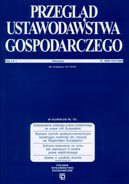Przegląd Ustawodawstwa Gospodarczego nr 08/2011
Publication date: 2011
Place publication: Warszawa
Binding: paperback
SPIS TREŚCI
Jakub Pokrzywniak, Uniwersytet im. Adama Mickiewicza w Poznaniu
O doniosłości przepisów dotyczących stosunków cywilnoprawnych w Prawie energetycznym
Summary
On relevance of the regulation of private-law relationships in energy
This article is about the regulation of private-law relationships in energy law. After all, legally relevant relationships between energy companies and their customers are in principle grounded in contract. The first matter dealt with is the status of the grid code. Its statutory regulation is very vague, but it seems we should see it as a kind of standard-form contract (standard terms of contract) within the meaning of the Civil Code. The article then moves on to tariff regulation. This, too, can be seen as an example of a standard-form contract, although, in comparison to the Civil Code, the Energy Act contains special provisions on commencement of tariffs. The matter discussed next is the characteristics of what the Energy Act terms a "comprehensive contract" (umowa kompleksowa). On a closer look, it essentially does not amount to any new type of contract. The Energy Act also lays down a regulatory framework for contract amendments. This framework is different from what is provided for in the Civil Code and, as such, gives rise to uncertainty whether it replaces or merely supplements the Civil Code provisions. The article then presents a critical approach to the issue of contract termination under the Energy Act. Finally, the discussion moves on to certain dilemmas concerning the effects of the so-called "terms of connection", including especially whether, under civil law, such terms create an obligation to enter into the connection contract.
Anna Brzezińska-Rawa, Uniwersytet im. Mikołaja Kopernika
Przesłanki oceny dyskryminacji cenowej jako przejawu nadużycia pozycji dominującej
Summary
Legal conditions for price discrimination as an indication for abuse of dominant position
The purpose of this article is to analyse the 5 constituent elements of price discrimination as an abuse of the dominant position on the relevant market. In order to establish discrimination, at least two of the compared transactions with third parties are equivalent. Next, the dominant undertaking must apply dissimilar conditions. In case of price discrimination, these dissimilar conditions obviously concern price as such, or the particular elements of it. Another legal condition is, that, as a result of applying dissimilar conditions, these third parties mentioned above (other trading parties) are placed at a competitive disadvantage. The article analyses three possible methods of interpretation of the notion “competitive disadvantage”: that there should be the evidence of actual or likely material competitive disadvantage, that the competitive disadvantage can be logically inferred from the market circumstances in which the abuse arises and finally, that the mere fact of discrimination establishes a presumption of competitive disadvantage. The last condition for finding the abusive price discrimination is that the discrimination can’t be objectively justified. The article concludes that the assessment of price discrimination should be focused on the economic effects on the market (both pro- and anticompetitive).
Bartłomiej Król, Uniwersytet Jagielloński
Sytuacja prawna osób pod rządami dyrektywy 2008/122/WE z dnia 14 stycznia 2009 roku w sprawie ochrony konsumentów w odniesieniu do niektórych aspektów umów timeshare, umów o długoterminowe produkty wakacyjne, umów odsprzedaży oraz wymiany
Summary
The legal situation of persons under the Directive 2008/122/WE
At the beginning the article contains a short description of the timesharing institution and the main points of the Directive 94/47/WE.
In the main body the article aims at providing the reasons behind changes in the European legislation concerning the timesharing institution and to determine the consequences of these changes for consumers. The article describes the basic objectives and the main theses of the Directive 2008/122/WE. The scope of the Directive 2008/122/WE, together with the legal remedies for consumers in case of the timesharing agreement breach are included. Furthermore, the information obligations of entrepreneurs providing the timesharing services are under consideration. The article also raises the needs of adaptation of the Polish law with the requirements of the European law.
Last but not least the article includes the fundamental information about the condition of Polish science concerning the matter of timesharing, whose legal status is still being disputed. The article provides a good introduction to a matter of timesharing under the Directive 2008/122/WE.
PRAWO WŁASNOŚCI INTELEKTUALNEJ
Jan Błeszyński, Uniwersytet Warszawski
Nowelizacja ustawy o prawie autorskim i prawach pokrewnych z 8 lipca 2010 r.
| Odbiór osobisty | 0 € |
| Kurier Inpost | 4 € |
| Kurier FedEX | 4 € |
| Inpost Paczkomaty | 4 € |
| Free delivery in Reader's Club | from 47 € |

